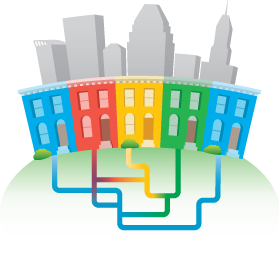Over the last few weeks I’ve been working with Baltimore Mayor Stephanie Rawlings-Blake, a diverse group of volunteers, my friend Tom Loveland (the Google Czar), and other city officials to organize a response to Google’s Request for Information regarding a potential investment of high-speed 1Gbps fiber-to-the-home Internet infrastructure.
Along the way, something remarkable happened.
We laid out a case for Baltimore, and it’s compelling. While other cities have been pulling stunts to try to get Google’s attention, we’ve been assembling a data and fact-driven case for why Baltimore in 2010 is uniquely suited to innovate with the addition of high-speed fiber infrastructure. Google’s corporate culture is famously and relentlessly data-driven. We’ve answered the questions completely, and have highlighted Baltimore’s unique strategic qualifications. We didn’t just stress “how badly we want this,” we built a concise, logical, and detailed case for why Google should want us.
While it’s probably been obvious that we have been working hard and generating press, the public is not aware of our overall strategy, and that’s partly because we have not been able to talk about all of it. Here are some of the reasons why Baltimore can and very likely will win this trial.
Baltimore is unique in that it owns and operates its own expansive conduit system; most cities do not, and this means that Baltimore can deploy a new network faster and less expensively than other cities can.
Baltimore is home to the only philanthropic field office of Open Society Institute, and founder George Soros (the world-famous financier) has pledged to support a Google investment in Baltimore with programs to help alleviate the digital divide. He has urged Google to select Baltimore as the site of this trial, citing the same reasons that Soros selected Baltimore for his philanthropic efforts.
We’re also working with Bob Kahn, co-inventor of TCP/IP to talk about new ways to archive and share municipal data. Mr. Kahn’s counterpart is the other “father of the Internet,” Vint Cerf, who is now a senior executive at Google. And we believe that Cerf will be helping to review these submissions.
We worked with the Economic Alliance of Greater Baltimore, the entity responsible for marketing Baltimore to the business world at large, to shape our messaging and ensure that we had factual economic data. The Greater Baltimore Committee collaborated to align its business members with the effort, securing letters and videos of endorsement from dozens of key large employers.
Last week, the FCC released its National Broadband Plan and one of its authors is a Baltimore City resident. We sought his counsel and advice.
We aligned support of our corporate community, including Under Armour, T. Rowe Price, and dozens of other companies. We received the enthusiastic support of Johns Hopkins University, The University of Maryland System, Loyola University, and a long list of other schools. Gilman School suggested that it could share its K-12 curriculum with the world with the addition of gigabit broadband.
The Space Telescope Institute produced a stunning, compelling video with astronaut John Grunsfeld.
We’re highlighting our burgeoning music and film scenes. In 2008 Baltimore was voted Best Music Scene by Rolling Stone, and the MICA-produced documentary “Music for Prudence” was just awarded an Oscar.
Urban development author James Howard Kunstler addressed the Downtown Partnership just yesterday, making the case that Baltimore is poised for a population explosion as we enter into an era of urban “redensification.” I share that vision and believe that high speed infrastructure is one of the most important urban design investments we can make today.
In this process, we have articulated a powerful vision for the future of Baltimore, and that vision isn’t going away. We’ve identified our key strategic strengths, and they are the foundations for our shared future. We can’t control whether Google will choose to make an investment here. But that’s not what is most important: we’ve built a case for why we should be investing in ourselves. And that’s a message that resonates with everyone from carriers and broadband providers to prospective residents and businesses.
We have several “aces in the hole,” and our prospects are beyond strong: we’re feeling lucky, as they like to say at Google. But frankly, if Google chooses not to invest here at this time, we should seriously consider making this investment ourselves — the returns would be immense.
Show your support for the BmoreFiber initiative on Facebook, Twitter, and our website, bmorefiber.com.

